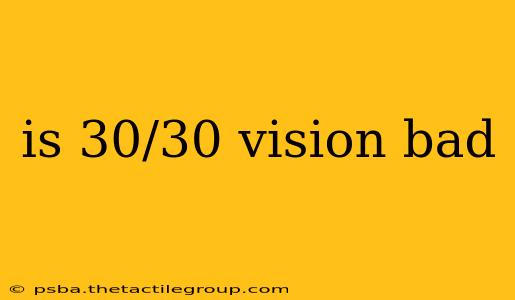So, you've had your eye exam, and the results show 20/30 vision. Is this bad? The short answer is: it's not bad in the sense of needing immediate corrective surgery, but it's also not perfect vision. Let's delve deeper into what 20/30 vision means and what you should know.
Deciphering the Eye Chart: What Does 20/30 Mean?
The Snellen eye chart, the one with all the letters, measures visual acuity. The numbers represent a fraction: the top number (20) is the distance you stand from the chart (20 feet), and the bottom number (30) is the distance at which a person with normal vision (20/20) can read the same line.
Therefore, 20/30 vision means you can see at 20 feet what a person with perfect vision can see at 30 feet. In simpler terms, you need to be closer to see things clearly compared to someone with 20/20 vision.
Is 20/30 Vision Legally Blind?
No, 20/30 vision is not considered legally blind. Legal blindness is typically defined as visual acuity of 20/200 or worse in the better eye, even with correction.
Is 20/30 Vision Considered Good Vision?
While it's not the sharpest vision, 20/30 vision is generally considered within the range of "normal" or "near-normal." Many people function perfectly well with this level of vision. However, it's important to understand that even minor vision impairments can impact daily life, especially activities requiring sharp focus like driving at night or reading small print.
Potential Causes of 20/30 Vision
Several factors can contribute to 20/30 vision, including:
- Refractive errors: These are the most common cause and include nearsightedness (myopia), farsightedness (hyperopia), and astigmatism. These conditions can often be corrected with eyeglasses or contact lenses.
- Aging: As we age, our eyes naturally lose some of their focusing ability, a condition called presbyopia.
- Underlying medical conditions: In rare cases, 20/30 vision could be a symptom of an underlying medical condition affecting the eyes or the nervous system.
What Should You Do If You Have 20/30 Vision?
If your eye exam revealed 20/30 vision, it's crucial to discuss your findings with your ophthalmologist or optometrist. They can determine the underlying cause and recommend the best course of action. This may include:
- Eyeglasses or contact lenses: These are often sufficient to correct refractive errors and improve visual acuity.
- Lifestyle adjustments: Improving lighting, increasing font size on screens, and taking breaks from close-up work can help manage visual strain.
- Further testing: If there's concern about an underlying condition, your doctor may recommend additional tests.
Conclusion: Don't Ignore Your Vision
While 20/30 vision isn't necessarily "bad," it's important to address it. Regular eye exams are crucial for maintaining good eye health and detecting potential problems early on. Don't hesitate to consult an eye care professional if you have any concerns about your vision. Early intervention can often prevent more serious problems from developing. Remember, clear vision is essential for a high quality of life.

